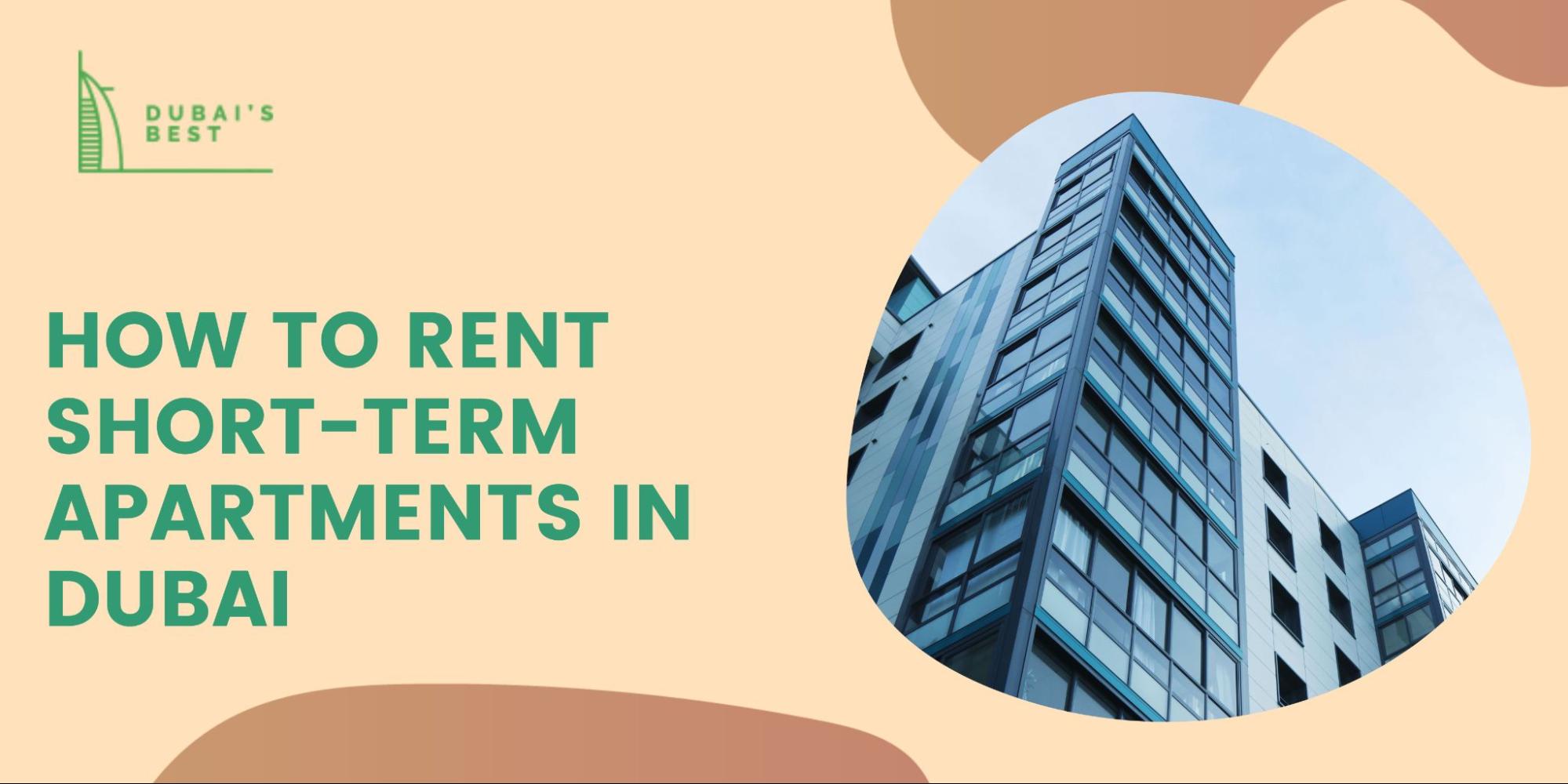How To Rent Short-Term Apartments in Dubai
Sometimes, we might need to stay in one city for a long time, which means that hotels aren’t an economical option. For these longer trips, an apartment would be a much wiser option.
If you need to stay in Dubai for longer than a week and are looking for a good place to stay, this guide might just be for you. Here’s how you can snag an apartment in the city for a short time!
How Do I Rent Apartments in Dubai?
The steps to rent a short-term apartment in Dubai are essentially quite simple. Find a place that you want, visit it, make an offer, and sign the agreement for it. You’ll also have to register with the Ejari as well as get a water and electricity connection via DEWA.
Non-Dubai residents, however, would need to provide more documents to their prospective landlord. Generally, a tourist visa alone will not be valid for this process.
Landlords usually require a renter to provide a copy of your passport and other residential documents, which we will discuss in further sections.
What are short-term rentals?
A short-term rental is loosely defined as getting to live in a property for six months or less. Payment is usually done in weekly or monthly options.
Short-term rentals are catered more for tourists and business people who prefer a “homier” place to stay in. These rental units are usually complete with all the household furnishings as well.
According to the Dubai Department of Tourism and Commerce Marketing (DTCM), the only unit type that is not available to rent for short-term are apartment hotels. These units are apartment complexes that use a hotel-style booking system of checking in or out.
Nevertheless, this means you can live in apartments, houses, villas, and others if they are available on the market.
Pros and Cons of Availing Short-Term Rentals in Dubai
Short-term rentals offer various advantages for anybody that’s interested.
First, they allow residents to easily move from one place to another. This is ideal if you want to experience living in different parts of the city.
Second, it can help you avoid paying any overhead costs for maintenance and upkeep. Usually, these fees are applicable to long-term residents only.
Lastly, properties classified as short-term rentals are ready to live in. Since they already come with furniture and fittings, they allow a new tenant to move in easily.
However, because the units are already furnished, a short-term rental property can also be more expensive in the long run.
Search For Listings
Searching for a place is the first and most difficult step you have to do. This is because there are a lot of properties to choose from!
First, we recommend that you consider how much you’re willing to pay. Once you have a budget on hand, you can easily narrow down the options.
Now, if you’re willing to spend a little bit more, you can always enlist the help of an agent. However, we estimate that they would charge you an additional 2% or 5% on top of the rent you need to pay.
Oh, and make sure to ask if they are registered with Dubai’s Real Estate Regulatory Agency (RERA). This would ensure your financial safety during the rental process.
Schedule A Tour
If you have a property chosen, it’s time to set a date for an on-site visit with the agent or the landlord of the property. Make sure to have a list of questions ready.
Remember to look at the location, the number of rooms and baths, and the nearby landmarks and businesses.
We recommend asking and checking the condition of fixtures, fittings, furniture, plumbing, and the security systems of the area. Also, make sure to check if electricity and water are already connected and running.
Make an Offer, Or Ask For The Rental Fee
Once you’ve decided on a place, the next step is to finalize the offer. If there’s already a pre-set rental fee, then check for how the payments will be made during your stay.
If you find yourself in a position to make the initial offer, try haggling the best deal possible!
Some owners might actually agree on lowering the rental fees if you pay for the entire amount of your stay in one lump sum payment or fewer installments.
Reserve It!
To fully secure the property you want to rent, you will need to pay a security deposit. Depending on the owner, the amount could range from one month’s rent or 5% of the total fee for your entire stay.
If you have an agent with you, make sure to get a receipt when you give the security deposit. This is because they would usually hold on to that money until the deal is finalized.
During this step of your apartment or property hunting, your landlord will require you to submit various documents. These include a copy of your passport and your residence or tourist visa.
In the case where you cannot provide your visa yet, an official document from your employer or sponsor saying it’s being processed would also be a valid substitute.
Sign The Contract
Once you submit all the necessary requirements, the landlord will provide a tenancy contract to you. Make sure to go over the contract and check if it is in accordance with the tenancy laws in Dubai.
If possible, we recommend asking for a second opinion from a legal expert. This can help you comb through the finer details of the contract that can potentially fool you during your residency if left unchanged.
Now, feel free to suggest changes if necessary. The most important part of the step is to know if you are comfortable with the terms and conditions.
If the contract is all good to you, sign and submit it along with the necessary payments to both the agent (if you have one) and the landlord.
Here’s a tip for you: keep a copy of the contract and receipt of both the document and the money whenever possible.
After all the signing and submissions, this is when you will finally be getting the keys and access cards for the property you will be staying in!
Ejari Registration
One of the most important steps of your rental process is to register your tenancy contract with the Ejari, which is mandated by the RERA.
The government requires this to protect you and your landlord during your tenancy period. Registering turns your contract to a legally-accepted document in the Emirates.
The documents you will need to bring include the original tenancy contract, the landlord’s title deed, you and your landlord’s passport copies, and a duplicate of your Emirates ID.
Get Some Water and Electricity
Now this step is both essential and optional. However, if the property you’re renting already has a connection for water and electricity, you can skip this section.
However, if your rental doesn’t include these necessities, you will have to do it yourself. You can get these by applying for a Dubai Water and Electricity Authority (DEWA) connection.
To do so, you’ll need the DEWA premise number of the property, your Ejari number, as well as copies of your and your landlord’s passports. You’ll also have to submit a completed DEWA form and pay a security deposit, which is refundable.
The standard prices for deposits are in the table below, for your reference. Outside of the security deposits, the miscellaneous fees listed are standard regardless of the length of stay or type of residence you’re renting.
(Optional) Get A Move-In Permit
Depending on where your property sits, you might need to procure a move-in permit before officially occupying the unit.
Some developers and landlords will require this document to help them keep up with the current information of the tenants in their location.
Aside from that, the permit will essentially help them keep up with the necessary fees a tenant needs to pay when they move out.
Ask your real estate agent or landlord if this is required. If it is, note that it takes up to 5 days to process, so you’ll need to take this into account before your official move-in date.
You can get a move-in permit from the developer or the contractor of the property you’re planning to temporarily live in.
The requirements for this process are a certificate of payment completion, copies of the tenancy contract, passport, Emirates ID, and the most recent service charge receipt from the landlord.
Looking for a place to stay for a short period of time is quite easy. However, it is quite tedious with the processes involved.
We hope that this short guide can be of assistance when you’re aiming to rent a property for a short time in Dubai!

